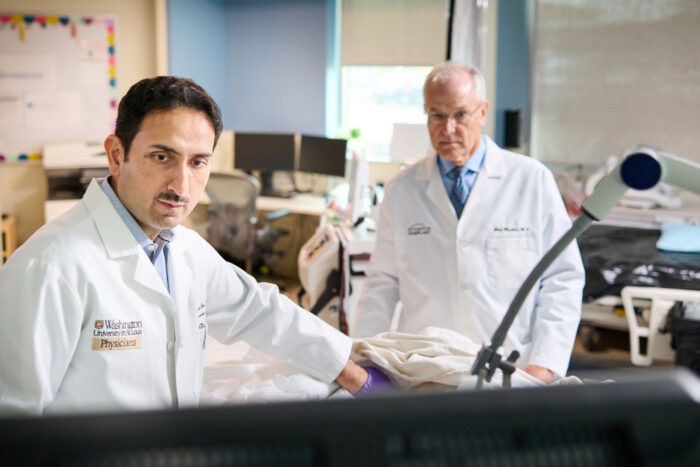Long-standing hormone treatment for donated hearts found to be ineffective
Practice of using thyroid hormones to preserve function for transplantation may even cause harm
 Matt Miller
Matt MillerWashington University physician Raj Dhar, MD, (front) and Gary Marklin, MD, the chief medical officer at Mid-America Transplant in St. Louis, care for a deceased organ donor. Dhar and Marklin led a study that showed that the long-standing practice of treating deceased organ donors with thyroid hormone does not help preserve heart function, may cause harm and should be discontinued.
Doctors managing deceased organ donors routinely treat the donors’ bodies with thyroid hormones in a bid to preserve heart function and increase the quantity and quality of hearts and other organs available for transplantation. However, according to a recent clinical trial led by researchers at Washington University School of Medicine in St. Louis and Mid-America Transplant in St. Louis, routine thyroid hormone intervention is not effective at achieving these goals, and may even cause harm.
The study is published Nov. 30 in The New England Journal of Medicine.
“There have been very few studies of what really works in terms of preserving organ function for donation — and with a shortage of donor organs for transplantation, it’s critical to do what we can to preserve organs and save lives with them,” said Raj Dhar, MD, a professor of neurology at Washington University and an attending physician in the Neurology/Neurosurgery Intensive Care Unit at Barnes-Jewish Hospital. Dhar is the corresponding author on the paper and led the clinical trial with Gary Marklin, MD, the chief medical and research officer at Mid-America Transplant, the organ-procurement organization for the St. Louis region.
“We decided to investigate whether intravenous thyroid hormone would result in more hearts transplanted,” Dhar said. “This practice has been adopted by multiple organ-procurement organizations and is used on thousands of organ donors each year, without ever having been rigorously studied. It turns out that it doesn’t have any benefit and may cause some harm. Our findings tell us we should halt this practice.”
When patients are declared dead according to neurologic criteria, their organs can be donated for transplantation with the consent of the deceased or their relatives. Deceased donors can provide up to eight organs, if all are in good shape. It can take up to 72 hours from the time of death to the time a transplant surgery begins. During that time, doctors such as Dhar and Marklin work to keep the donors’ hearts beating as normally as possible to preserve the health of the heart and other organs. But despite doctors’ best efforts, about half of all such hearts deteriorate and are not suitable for transplantation when the time comes.
Previous observational studies have suggested that giving deceased donors thyroid hormones may increase a heart’s viability. Thyroid hormones influence the force and speed of heartbeats, and levels of the hormones can fall once the brain stops working. At the same time, some doctors worry that treating donor hearts with intravenous thyroid hormones may increase the risk of fast heart rate and high blood pressure, which could injure other organs and make them less suitable for transplantation. Despite these concerns and a lack of definitive evidence in support of the practice, hormone supplementation for deceased organ donors has become standard.
“I have always been skeptical of the benefits of thyroid hormone in donor management based on its physiology and the previous published studies, which is why we did not use levothyroxine to treat our donors at Mid-America Transplant,” Marklin said. To date, Mid-America Transplant has cared for more than 2,700 deceased organ donors at their independent organ recovery center, more than any other organ-procurement organization in the nation.
“But since more than 70% of the organ-procurement organizations do use thyroid hormone, Dr. Dhar and I felt we needed to do the definitive study to answer this important question: Does giving organ donors thyroid hormone preserve heart function and make more hearts available for transplantation?” Marklin continued. “It is very unusual to have a study of deceased organ donors of this size and with such sufficient rigor, but we believed the four-year, multicenter research was critical to definitively answer this key question to enable better organ donor management.”
Dhar and Marklin pulled together a team across 15 organ-procurement organizations nationwide, including Mid-America Transplant. With authorization for research provided by their families, 838 organ donors who had been declared dead according to neurological criteria were enrolled. Half were randomly selected to receive levothyroxine within the first 24 hours while the others were given saline. Levothyroxine is a synthetic form of the human thyroid hormone T4, commonly used to treat hypothyroidism. The study was not blinded so that organ recipients could be fully informed about the hearts they were about to receive. Each organ-procurement organization followed its own standard donor care and organ allocation protocols for all donors enrolled in the study.
Thyroid hormone treatment made no significant difference in the number of hearts successfully transplanted. Just over half of the hearts from each group were suitable for transplantation: 230 (54.9%) from the thyroid hormone group and 223 (53.2%) from the placebo group. Of the 453 hearts transplanted, 97.4% of the hearts from thyroid hormone-treated donors and 95.5% of hearts from placebo-treated donors still worked well for the recipients after 30 days. This small difference was not statistically significant.
Further, thyroid hormone was more likely to cause hypertension and fast heart rate before donation. These adverse effects became less severe or disappeared when the doses of hormones were reduced or discontinued in the thyroid hormone group, indicating that the hormone may cause temporary overstimulation of the heart in addition to having little to no effect on heart transplant efficiency.
“We found good evidence that this intervention we’ve been using for 40 years doesn’t work,” Dhar said. “It’s vital that we explore questions like this to ensure we are doing all we can for patients who need organs — and to ensure that they receive the most benefit possible from the generous people who choose to donate organs.”
After seeing the results, several organ-procurement organizations have stopped using thyroid hormone in treatment of organ donors, Dhar said.






